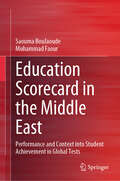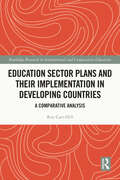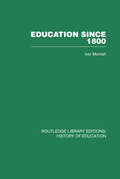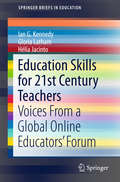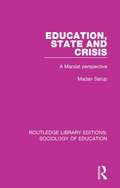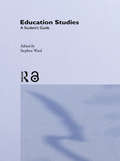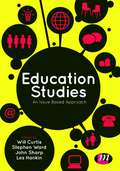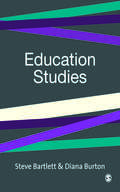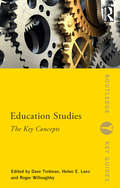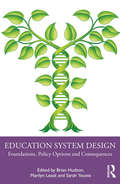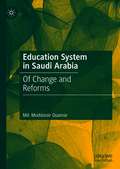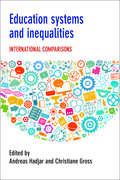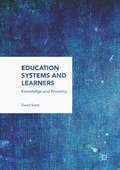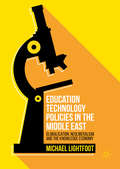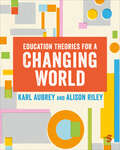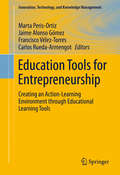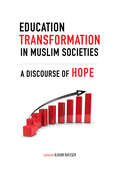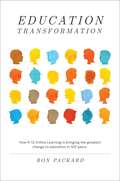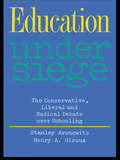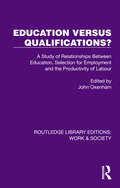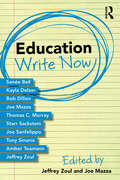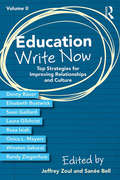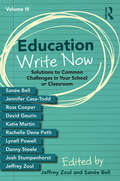- Table View
- List View
Education Scorecard in the Middle East: Performance and Context into Student Achievement in Global Tests
by Saouma BouJaoude Muhammad FaourThis book examines student achievement in global tests in Middle Eastern countries. Through statistical analysis of published TIMSS, PISA and PIRLS results, it explores the impact of context on student performance in Arab States, Israel, Iran, and Turkey. The volume concentrates on measuring education quality through international test results in reading, mathematics, and science, demonstrating long-term investment by teachers, principals, education agencies, and societies at large. Educational system features that shape outcomes are taken into account, along with contextual social, economic, political and cultural factors. In addition to scrutinizing gender gaps, school climate, home influence, teaching quality, students’ math/science attitudes, and the role of tech, a special chapter addresses the impact of Covid-19 on education.
Education Sector Plans and their Implementation in Developing Countries: A Comparative Analysis (Routledge Research in International and Comparative Education)
by Roy Carr-HillThis book examines the factors affecting the successful implementation of Education Sector Plans in developing countries. It provides a detailed comparison that draws on data from 27 countries to offer careful research conclusions and policy recommendations. Offering a detailed comparison of the schooling situation (e.g. availability of potable water and toilets, provision for the disabled) as well as educational outcomes (both test scores and percentages out-of-school) from the 27 countries using empirical evidence, the book examines the resources that have been invested in different education sectors, investigating the development and success of each plan. The volume uses correlation analysis to compare factors including the availability of government funding, national characteristics, ministerial decisions, influences of country and donor stakeholders, as well as district- and school-level issues. Thorough comparative analysis of the data is then demonstrated, with two measures of achievements to identify which factors can be considered as the most important in order to reach realistic policy and research conclusions. Timely and engaging, this book will be of great interest to researchers, scholars, and postgraduate students in the field of education and international development, comparative education, and international education more broadly.
Education Since 1800 (Routledge Library Editions: History of Education #24)
by Ivor MorrishOriginally published in 1970, this volume provides a survey of the wide field of the development of education since 1800. The book is structured as follows: Part One: The General Development of Popular Education English Elementary Education, the Development of Primary Education, English Secondary Education Part Two: Specific Topics in Education Independent, Private and Public Schools, Technical and Technological Education, The Universities, Teacher Training, Further and Adult Education, The Youth Services Part Three: Educational Thinkers Johann Friedrich Herbart (1776-1841), Friedrich Froebel (1782-1852), Froebelianism and Montessori, John Dewey (1859-1952).
Education Skills for 21st Century Teachers
by Ian G. Kennedy Gloria Latham Hélia JacintoThis monograph presents the current views, challenges and future needs of educators from a global online exchange where educators and researchers discuss the 21st century skills needed by students and teachers. The three editors, who participated in the global online research discussion group, also assumed the role of authors to summarise, analyse and celebrate the myriad of ideas generated in a topic thread that had well over a thousand responses from 26 countries. Through Comparative Analysis they then compared the posters' ideas to some current big thinkers in education. This text promotes teachers' voices from diverse disciplines and sectors who are united in their desire for purposeful and radical change in how teaching is carried out and what is taught. The text advocates shifting power away from government control and standardisation towards empowering teachers to guide and further develop the unique talents of diverse individuals.
Education State and Crisis: A Marxist Perspective (Routledge Library Editions: Sociology of Education #47)
by Madan SarupFirst published in 1982, this work is a critical survey of contemporary educational debates and themes which took on new urgency and importance at the time. In particular, it explores the problematic nature of ‘progressive education’ and ‘discipline’; the changes in the labour process and youth unemployment; the nature of the state and its relationship with schooling; the growth of state intervention and the specific forms of discrimination suffered by women and black people. It argues that trends in education at the time can be explained by a Marxist analysis. It suggests that the changes taking place in schools and colleges were expressions of the contradictions of capitalism and of the state’s attempt to restructure education.
Education Studies: A Student's Guide
by Stephen WardWritten specifically for students on Education Studies degree courses, yet also relevant for students on teacher training courses, Education Studies: A Student's Guide introduces a wide range of topics and issues, from knowledge and learning, and policy and schooling to the ways in which education is a force for change across the globe. The book is split into three comprehensive sections which challenge our assumptions about education. It explores a wide range of perspectives on education in different countries and cultures, provides critiques of current policies and practice and analyzes learning and the nature of knowledge itself. Specific topics covered include: the global dimension in the curriculum cultural and religious plurality in education the effective teacher gender and educational achievement special educational needs and inclusion in mainstream schools ICT and learning for the future language, power and education. With chapter summaries, questions for discussion and reflection and suggestions for further reading, Education Studies: A Student's Guide will be a valuable resource for all students of Education Studies as well as BEd and PGCE students.
Education Studies: An Issue Based Approach
by John Sharp Stephen Ward Les Hankin Will CurtisEducation Studies continues to grow as a popular undergraduate area of study. This core text addresses themes common to all Education Studies courses. It benefits from a large list of chapters from key contributors at key institutions. This third edition has been completely revised and updated with the addition of seven new chapters. Themes newly explored include gender, research, the power of money and status and alternatives to schooling. This fully comprehensive text is accessibly written, with learning features throughout to encourage students to approach issues critically. Fully up-to-date and covering a huge range of themes for Education Studies students.
Education Studies: An Issues-based Approach
by John Sharp Stephen Ward Les HankinEducation Studies continues to grow as a popular undergraduate area of study in the UK. This core text addresses themes common to all education studies courses. It benefits from a large list of contributors from key institutions. This fully revised and updated second edition includes chapters on education and employment, new media, and sex and relationships education. For each topic, an overview and discussion are accompanied by features such as 'Research' and 'Pause for Thought' boxes to promote reflection and analysis.
Education Studies: Essential Issues (One-off Ser.)
by Dr Steve Bartlett Dr Diana M Burton`The essays are thematically well organized and lucidly presented. In terms of design, contents and presentation, this is undoubtedly an excellent textbook' - Journal of Educational Planning and Administration `Education Studies: Essential Issues' is a book similar in style to the editor's first volume 'Introduction to Education Studies', both books introducing a variety of broad educational issues while analyzing certain areas in greater depth. Whereas the first book dealt with wider perspectives on education (i.e. research, politics and policy, psychological theory), this book deals with more specific issues with chapters viewing education through early years and compulsory schooling to post-compulsory and higher education, through to lifelong learning. Ultimately this book is quite unique due to the collection of chapters and is a worthy addition to any university bookshelf or as a key text for mandatory education modules' - Scott Buckler, University of Worcester, for Escalate `This book is essential reading for all those concerned about education, especially for those working within the education system' - International Journal of Educational Management `[Education Studies] is an informed and informative introduction. Teachers as well as student teachers will find it stimulating and valuable. Topics it covers well include teacher management and teacher professionalism' - Michael Duffy, Times Educational Supplement This key text provides an overview of current theoretical issues, areas of study and major themes that are covered in education studies programmes. Chapters include: - globalization - differentiation - early childhood - special needs - citizenship and education - lifelong learning - post-compulsory education - higher education - management and professionalism in teaching - education and economic development. Prominent contributors in each field provide students with a solid grounding in the areas they will be studying and point the way to further successful study. Also by same author Introduction to Education Studies Steve Bartlett Diana Burton Nick Peim C 0-7619-7015-0 £60.00 2001 P 0-7619-7016-9 £17.99 2001
Education Studies: The Key Concepts (Routledge Key Guides)
by Dave Trotman, Helen E. Lees and Roger WilloughbyWritten by educational specialists and including over fifty interdisciplinary entries, this essential compendium offers accessible, detailed definitions of the core concepts typically explored on undergraduate Education Studies courses. Its interactive design clarifies topics at an introductory, intermediate and advanced level, supporting students across the three years of their undergraduate study. The history and evolution of each concept is outlined with concepts practically grouped around four interrelated key educational categories - the personal, philosophy, practice and power. Key academic debates and points of contest are explored, reference to real-life educational examples are offered, and reflective questions and further reading scaffold critical engagement. Education Studies: The Key Concepts is a bookshelf must-have, moving readers towards a coherent stance based on theory and research. It is an easy-to-use resource for anyone looking to better understand education. It is also useful for those researching education at postgraduate level to broaden their educational knowledge base outside their specific foci.
Education System Design: Foundations, Policy Options and Consequences
by Marilyn Leask Sarah Younie Brian HudsonThis book highlights decisions governments have to make about their public education systems, the options they have before them and the consequences of their decisions. As well as covering issues such as values, curriculum, teacher training, structures and so on, the book addresses education planning for epidemics, pandemics and disasters. Education systems provide the foundations for the future wellbeing of every society, yet existing systems are a point of global concern. Education System Design is a response to debates in developing and developed countries about the characteristics of a high-quality national education service. It questions what makes a successful system of education. With chapters that draw on experience in education systems around the world, each one considers an element of a national education service and its role in providing a coherent and connected set of structures to ensure good education for all members of society. Key topics include: Existing education systems and what a future system might look like Inclusion and social justice Leadership and teacher education Policy options, and the consequences of policy changes This book suggests an education system be viewed as an ecosystem with interdependencies between many different components needing to be considered when change is contemplated. It is a vital book for any stakeholders in educational systems including students, teachers and senior leaders. It would be particularly useful to policy makers and those implementing policy changes.
Education System in Saudi Arabia: Of Change and Reforms
by Md. Muddassir QuamarThis book is a comprehensive study on the education system of Saudi Arabia, placing the reforms and changes it has undergone in the past two decades within the context of the historical evolution of the education system. An education system cannot be seen in isolation of the society; it plays a significant role in shaping the individual, state and the society, that in turn, have a bearing on the education system and its evolution. Therefore, this book locates Saudi education in the backdrop of the changes in the society, how they have facilitated or hindered the education reforms and how the education reforms have impacted the society. The book does not ignore the immediate trigger for the beginning of a comprehensive reforms process but goes beyond it to find much deeper socio-political and economic rationales that paved the way for the reforms. It provides a nuanced understanding of the interplays of various socioeconomic as well as political factors that have shaped the education system in Saudi Arabia.
Education Systems and Inequalities: International comparisons
by Andreas Hadjar and Christiane GrossEPUB and EPDF available Open Access under CC-BY-NC-ND licence. How do education systems shape educational inequalities and differences in educational outcomes? And how do advantages and disadvantages in educational attainment translate into privileges and shortcomings in labour market and general life chances? Education systems and inequalities compares different education systems and their impact on creating and sustaining social inequalities. The book considers key questions such as how education systems impact educational inequalities along such variables as social origin, gender, ethnicity, migration background or ability and what social mechanisms are behind the links between education system and educational inequalities and provides vital evidence to inform debates in policy and reform.
Education Systems and Learners
by David ScottThis book explores curricular, teaching and learning practices in schools in England and in higher education institutions, and considers the damaging effects of the Research Excellence Framework (REF) for UK higher education institutions, international comparative assessment systems such as the Programme for International Student Assessment (PISA), and broadly, how educational judgements are now made about educational matters. David Scott criticizes the implementation of neo-liberal policies and practices in education systems round the world, management and control system approaches, and empiricist/positivist research agendas. The book offers an account of a new education model, which is directly in opposition to agendas currently supported by the right of the political spectrum. It will be of interest to teachers and students of education, the education research community, practising and trainee teachers, and education policy makers.
Education Technology Policies in the Middle East
by Michael LightfootThis book explores the potential educational technologies have for transforming education in the Middle East. Although technology has increasingly become a part of classrooms around the globe over recent decades, its application in classrooms in the MENA region remains underused and this book draws on a case study from the Arabian Gulf to examine the beneficial impact technologies have on teaching and learning. The book identifies the many social and cultural pressures that prevent government technology policies to be implemented in the way that the international community would find recognisable and acceptable and how education policy from the Global North is transplanted into a separate context without considering the different requirements. The study seeks to address the ways in which educational technology policy in government schools plays a part in the enactment of education reforms and how government policy aspirations are played out in practice. iv>
Education Theories for a Changing World
by Karl Aubrey Alison RileyHow can education be a vehicle for social change? This book looks at how different educational theories can be used to address complex and vital issues in society by exploring key concepts and challenging traditional thought through an educational lens. Each topic area is explored in both theoretical and practical terms with direct application to the classroom throughout. Key topics include: The climate crisis The Black Lives Matter movement The rise of right-wing populism The experience of LGBTQ+ students in school The impact of COVID-19 This is essential reading for anyone training to teach at any age phase and students undertaking the academic study of education.
Education Theories for a Changing World
by Karl Aubrey Alison RileyHow can education be a vehicle for social change? This book looks at how different educational theories can be used to address complex and vital issues in society by exploring key concepts and challenging traditional thought through an educational lens. Each topic area is explored in both theoretical and practical terms with direct application to the classroom throughout. Key topics include: The climate crisis The Black Lives Matter movement The rise of right-wing populism The experience of LGBTQ+ students in school The impact of COVID-19 This is essential reading for anyone training to teach at any age phase and students undertaking the academic study of education.
Education Tools for Entrepreneurship
by Marta Peris-Ortiz Carlos Rueda-Armengot Jaime Alonso Gómez Francisco Vélez-TorresThis book examines education in entrepreneurship through an action-learning environment that uses educational innovation tools. It explores various education tools, technology tools and pedagogical methods being implemented into university curriculums around the world. Entrepreneurship in society is rapidly gaining popularity as entrepreneurial activities aimed to create social value are fundamental in the development of an innovative, sustainable economy. This notion has been encouraging universities to incorporate entrepreneurship-related competencies into the curriculums of almost all subjects. Thus, developing an action-learning environment with educational innovation tools, technology tools and pedagogical methods is becoming increasingly important to universities. Students must be fully prepared to face the many challenges in the world and to help develop an innovative and sustainable economy. Universities should therefore promote active learning through innovation so that students can become active participants in their learning. Featuring contributions and case studies from academics, researchers and practitioners from around the world, the is book provides international perspective into entrepreneurship education and innovation.
Education Transformation in Muslim Societies: A Discourse of Hope (Advancing Education in Muslim Societies)
by Shelley Wong Nuraan Davids Andreas M. Krafft Bassam Abu Hamad Mualla Selcuk Suhailah Hossien Sulieman Mleahat Nora El-Bilawi Sher Afgan Tareen Afeefa Syeed Tyron PittsHope is a complex concept—one academics use to accept the unknown while also expressing optimism. However, it can also be an action-oriented framework with measurable outcomes.In Education Transformation in Muslim Societies, scholars from around the world offer a wealth of perspectives for incorporating hope in the education of students from kindergarten through university to stimulate change, dialogue, and transformation in their communities. For instance, though progress has been made in Muslim societies on early education and girls' enrollment, it is not well documented. By examining effective educational initiatives and analyzing how they work, educators, policymakers, and government officials can create a catalyst for positive educational reform and transformation. Adopting strength-based educational discourse, contributors to Education Transformation in Muslim Societies reveal how critical the whole-person approach is for enriching the brain and the spirit and instilling hope back into the teaching and learning spaces of many Muslim societies and communities.Education Transformation in Muslim Societies is a copub with the International Institute of Islamic Thought.
Education Transformation: How K-12 Online Learning Is Bringing the Greatest Change to Education in 100 Years
by Ron PackardEducation Transformation, authored by the leading expert in customized online education, Ron Packard, shows why technology is critical to the future of education and the future of our nation&’s children. We can no longer afford to lag, the benefits of technology must be harnessed for the benefit of students nationwide and around the globe. It is an imperative.One size does not fit all in education – Education Transformation shows us how technology can be used to accommodate individual&’s needs rather than making each student force fit into the traditional classroom model which works for many but not for all. Like so many other modern conveniences, education can benefit from technological advancement, and only technology can provide personalized instruction affordably. Education Transformation has never been needed more than today. It is the future of education and of our nation&’s children.
Education Under Siege: The Conservative, Liberal and Radical Debate over Schooling (Critical Studies In Education)
by Henry A. Giroux Stanley AronowitzFirst published in 1987. Routledge is an imprint of Taylor & Francis, an informa company.
Education Versus Qualifications?: A Study of Relationships Between Education, Selection for Employment and the Productivity of Labour (Routledge Library Editions: Work & Society)
by Oxenham JohnOriginally published in 1984, this book investigates the validity of educational qualifications: how they are determined, what justifications exist for them and how they change. It examines the assumption linking education and productivity and explores the belief that the ways in which scholastic qualifications are acquired distort education. In the investigations, the labour market, the school and community are not treated as ‘black boxes’ with no questions asked of their contents. Each is opened and placed under the microscope. Human resource personnel are asked to explain qualifications and selection for jobs. Supervisors are asked to estimate the quality of their workers. Teachers are observed in classrooms. Parents are asked what they hope for when they send their children to school. Simultaneously, research from a wide range of countries and cultures is explored.
Education Write Now
by Joe Mazza Jeff ZoulIn this innovative new series Education Write Now, ten of education’s most inspiring thought-leaders meet for a three-day retreat to think and write collaboratively, and then bring you the top takeaways you need right now to improve your school or classroom. This first volume, edited by Jeff Zoul and Joe Mazza, focuses on the all-important but often uncomfortable concept of change. Each concise chapter addresses how teachers and leaders can do the hard work of enacting change so more students succeed—academically and emotionally. You’ll gain practical insights and strategies for changing how we think about... Embracing Change (Jeff Zoul) Learning (Tony Sinanis) Assessment (Starr Sackstein) Relationships (Kayla Delzer) Mental Health (Joe Mazza) Educational Technology (Thomas Murray) Teacher Engagement (Sanée Bell) Leadership (Amber Teamann) Partnerships (Bob Dillon) Communication (Joe Sanfelippo) The royalties generated from this book will support the Will to Live Foundation, a nonprofit foundation working to prevent teen suicide. Dr. Jeffrey Zoul (@jeff_zoul) is a lifelong teacher, learner, and leader. During Jeff’s distinguished career in education he has served in a variety of roles, most recently as Assistant Superintendent for Teaching and Learning with Deerfield Public Schools District 109 in Illinois. Jeff also served as a teacher and coach in Georgia before moving into school administration. He has authored many books, including What Connected Educators Do Differently. Dr. Joe Mazza (@joe_mazza) is Lecturer at The University of Pennsylvania’s Graduate School of Education. He is the Founder/CEO of MakerDads, a new father and family engagement initiative bringing dads, grand-dads and other male role models together to support student learning through innovation. Joe’s innovative work has been featured in 15 books dating back to 2005. Most recently, he co-authored Lead Learners: Creating a Culture of Empathy, Innovation, and Empowerment with Derek McCoy (Routledge, 2018).
Education Write Now, Volume II: Top Strategies for Improving Relationships and Culture
by Jeffrey Zoul Sanée BellIn this innovative series Education Write Now, ten of education’s most inspiring thought-leaders meet for a three-day retreat to think and write collaboratively, and then bring you the top takeaways you need right now to improve your school or classroom. This second volume, edited by Jeff Zoul and Sanée Bell, focuses on relationships—the heart of everything we do in education. Building strong relationships and a positive school culture takes intentional, consistent effort, and the authors provide strategies and examples to help you along the way. Throughout the book, you’ll find insights and inspiration on these topics: Connecting the dots among students and staff (Jeffrey Zoul) Strengthening relationships in the learner-centered class (Randy Ziegenfuss) Building a culture of equity and access (Rosa Isiah) Cultivating student strengths and interests (Elisabeth Bostwick) Bridging the gap between schools and families (Laura Gilchrist) Deepening connections through productive conflict (Sanée Bell) Finding relationships beyond the four walls (Onica Mayers) Connecting through the power of generosity (Winston Sakurai) Bringing passion into the schoolhouse (Sean Gaillard) Tapping into dreams for a world-class culture (Danny Bauer) The royalties generated from this book will support the Will to Live Foundation, a nonprofit foundation working to prevent teen suicide.
Education Write Now, Volume III: Solutions to Common Challenges in Your School or Classroom
by Jeffrey Zoul Sanée BellIn this innovative series Education Write Now, ten of education’s most inspiring thought-leaders meet for a three-day retreat to think and write collaboratively, and then bring you the top takeaways you need right now to improve your school or classroom. This third volume, edited by Jeffrey Zoul and Sanée Bell, focuses on overcoming common problems in your classroom or school. There are many challenges we face as educators, no matter what kind of district or building we work in. The authors provide practical, insightful solutions and inspiring stories to motivate you on your journey, so you can get past the roadblocks and focus on what matters most—bringing all students to success. Topics include: Sustaining Joy (Lynell Powell) Breaking Free from Isolation (Rachelle Dene Poth) Broadening Our Definition of Literacy (Jennifer Casa-Todd) Making Libraries Relevant (Josh Stumpenhorst) Developing Perseverance in Kids (David Geurin) Promoting Positive Student Behavior (Jeffrey Zoul) Connecting with Students of Color (Sanée Bell) Elevating Instructional Supervision (Ross Cooper) Shifting Professional Learning (Katie Martin) Maintaining Staff Morale (Danny Steele) The royalties generated from this book will support the Will to Live Foundation, a nonprofit foundation working to prevent teen suicide.
